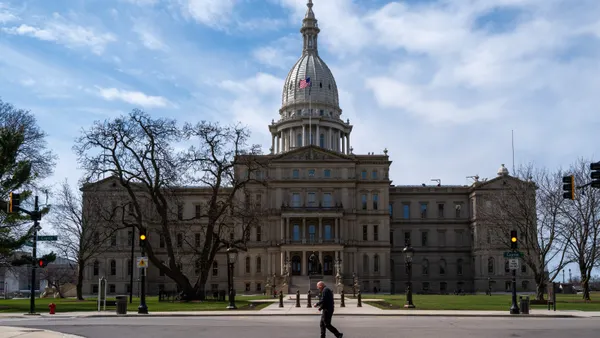A federal judge has reinstated two Democratic members of the National Credit Union Administration fired by President Donald Trump earlier this year.
“[T]he government concedes the President lacked any cause for the terminations,” U.S. District Judge Amir Ali wrote of Todd Harper and Tanya Otsuka’s firings. “The government argues instead that the President maintains absolute authority to remove NCUA Board members at will, and that reinstatement is not an available remedy. These arguments — which the government all but concedes would apply equally to the Chair of the Federal Reserve and FDIC Board members — are unavailing.”
Trump fired Harper and Otsuka in April, leaving one sole member – Republican Chair Kyle Hauptman – to lead the NCUA. With just one member, the NCUA could still perform its supervisory and enforcement duties, but without a quorum of two members, the board cannot vote to implement any policy changes or approve new enforcement actions.
Harper and Otsuka both sued the president later that month for what they called “patently unlawful removal[s].”
“Today’s ruling in favor of immediately restoring the Board to its full capacity is a real win for the 143 million Americans who rely on the National Credit Union Administration to protect their rights and insure their deposits,” Harper said in an emailed statement. “It’s also a win for all credit unions by maintaining the agency’s future independence. I look forward to once again working with my fellow Board members and the outstanding team at the NCUA to ensure our credit union system and our economy remain safe, stable, sound, secure, and fair.”
In a separate emailed statement, Otsuka said that she “look[s] forward to getting back to work to make sure we have a safe and resilient financial system.”
Decades ago, the NCUA was led by a single administrator and advisory board who served “at the pleasure of the President.” But those words were taken out of its statutory text in 1978, when Congress restructured the agency and replaced the sole administrator and advisory board with a governing board structure comprised of three members serving “fixed, staggered six-year terms with no more than two members affiliated with the same political party.”
In his ruling, Ali included that the Senate Banking Committee’s legislative history “reveals” that it “believed the six year terms would protect NCUA Board members from at will removal during their appointed terms.”
The NCUA declined to comment on the judge’s decision, as did the Justice Department.
Since returning to the Oval Office in January, Trump has fired the leadership of several federal agencies, which traditionally operate independently of the White House, including at the Federal Trade Commission, National Labor Relations Board and Merit Systems Protection Board. A federal judge ruled last week that Trump’s removal of FTC commissioner Rebecca Kelly Slaughter was illegal. The Supreme Court in May granted Trump the right to move forward with the firings at the NLRB and MSPB, however.
Trump has reportedly been flirting with the idea of firing Fed Chairman Jerome Powell, whom he’d appointed during his first presidential term in 2017. The president can legally fire the Fed chair only “for cause,” and it’s never happened before. Meanwhile, bank CEOs have been rallying around the importance of an independent Fed; and Sen. Elizabeth Warren, D-MA, rarely a Powell ally, has asserted that his firing would be illegal.
In his ruling, Ali wrote that “[t]he overlap in powers wielded by the NCUA Board and the Federal Reserve, and their common role as financial regulators, supports the conclusion that Congress can insulate NCUA Board members from at-will removal.”












